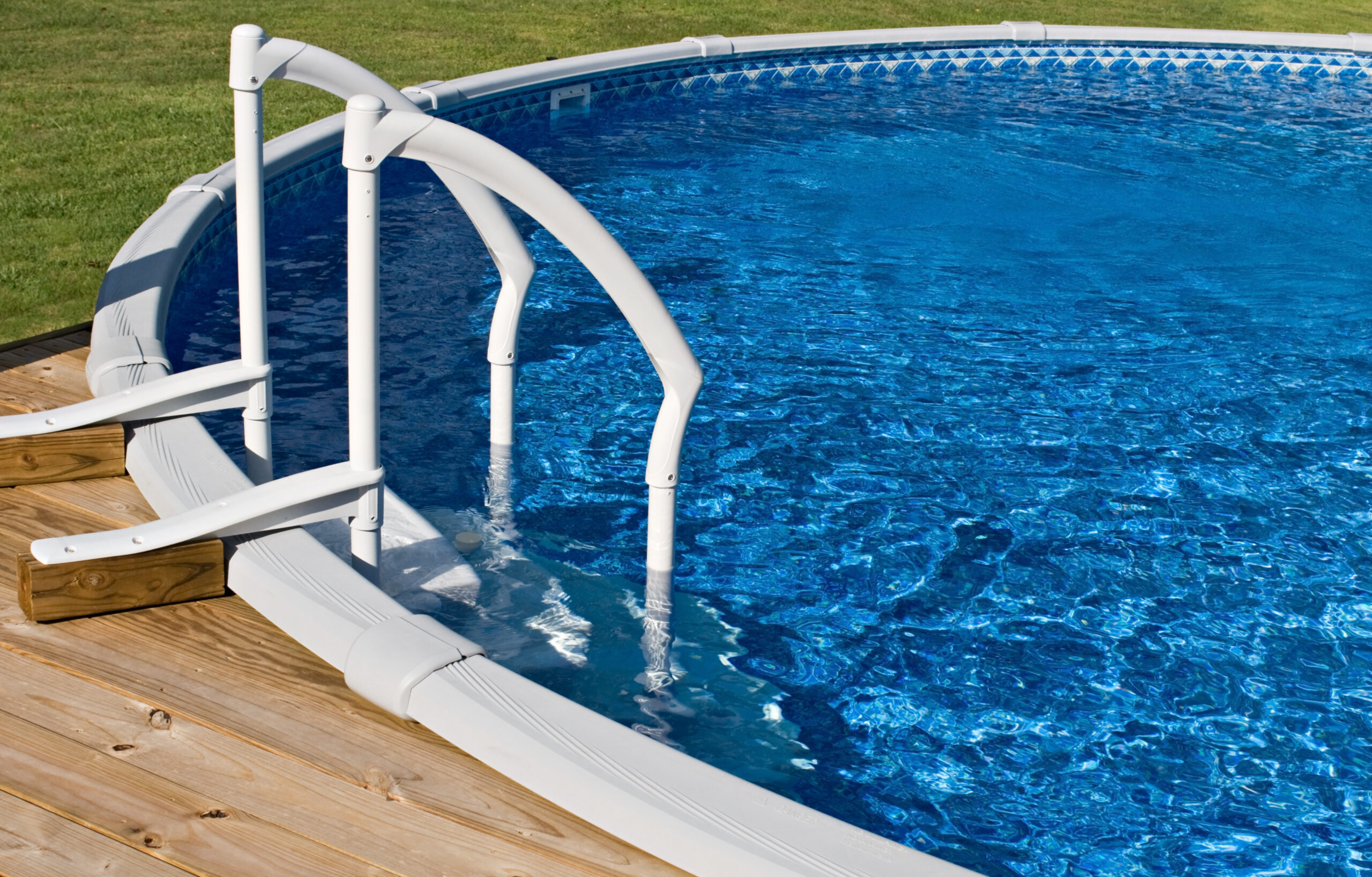You’re considering adding a pool to your backyard, but you’re torn between in-ground and above-ground options. Don’t fret! We’ve got you covered.
In this guide, we’ll walk you through the key factors to consider – from costs and installation complexities to maintenance and property value impacts.
Let’s dive in, so you can make an informed decision that suits your lifestyle, budget, and home aesthetics perfectly.
Understanding the Key Differences Between In-Ground and Above-Ground Pools
Let’s dive right into understanding the key differences between in-ground and above-ground pools.
When evaluating pool aesthetics, you’ll find a stark contrast. In-ground pools blend seamlessly with your landscape, offering a more natural and sophisticated look. They can be designed in various shapes and sizes, allowing for customization to suit your property. On the other hand, above-ground pools have a more casual vibe with their typical round or oval design.

Safety features are another crucial aspect to consider. With in-ground pools, there’s an increased risk of accidental falls due to their level ground access but this can be mitigated by installing fences or alarms. Above-ground pools tend to be safer as they require ladders for entry, creating a natural barrier that is particularly beneficial if you’ve got little ones running around.
In terms of cost and maintenance, above-ground pools are generally cheaper and easier to install but may not last as long as their counterpart. In contrast, in-ground pools require significant investment initially but promise longevity and potentially enhancing property value.
It’s essential you weigh these factors carefully before deciding which pool fits best with your lifestyle, aesthetics preference, and safety concerns.
Evaluating the Cost Factors of In-Ground and Above-Ground Pools
You’ll need to assess your budget thoroughly as the expense of installing and maintaining each type of swimming oasis can vary significantly. As you explore pool financing options, be aware that above-ground pools tend to have lower initial costs, but in-ground pools may add more value to your property in the long run.
Keep in mind that maintenance costs for both types can accumulate over time. Above-ground pools often require fewer chemicals and less extensive cleaning due to their smaller size. However, they might need replacement parts more frequently.
In-ground pools can present higher upfront costs as they involve excavation and construction work. Yet, with proper care, they’re known for their durability and longevity.
Insurance implications are another crucial cost factor in your decision-making process. Since an in-ground pool is considered a permanent addition to your home, it might increase your home insurance premiums. An above-ground pool, on the other hand, could be classified as personal property rather than a part of the house’s structure – possibly impacting policy rates differently.
Ultimately, understanding these cost factors will help ensure you’re making an informed choice about which pool best suits not only your lifestyle but also your financial comfort zone.
Considering Installation Time and Complexity for Each Pool Type
It’s important to remember that installation time and complexity differ greatly for each type of swimming oasis. When considering a pool, you’ll need to factor in more than just cost – the aesthetics, safety measures, and installation specifics are all crucial aspects.
Here’s what you should keep in mind:
– In-ground pools take longer to install due to excavation requirements but offer superior aesthetics.
– Above-ground pools can be set up more quickly, though their aesthetics are often less appealing.
Safety measures vary: In-ground pools may require fencing or alarms while above-ground options can be easily secured when not in use.
The complexity of installation is higher for in-ground pools due to plumbing and electrical work needs.
Maintenance requirements also differ: In-ground options generally demand more upkeep.
By understanding these factors, you’re better able to make an informed decision about your future oasis. Balancing pool aesthetics with safety measures and installation logistics will ensure that your choice serves you well for years.
Dive into this process with knowledge and foresight; it’s the key to a satisfying pool ownership experience.
Exploring Maintenance and Durability Aspects of In-Ground and Above-Ground Pools
Diving deeper into your decision-making process, we’re now going to explore the maintenance and durability aspects of in-ground and above-ground water basins. Your pool’s longevity is crucial, so let’s unravel the factors that directly impact it.
In terms of durability, in-ground pools usually outlast their above-ground counterparts due to their robust construction. They’re typically made from concrete, fiberglass, or vinyl liner which resist wear and tear better than above-ground pool materials.
However, with greater durability comes increased maintenance responsibilities. In-ground pools require regular upkeep ranging from chemical balancing to potential liner replacements. This boosts their cost over time but enhances pool safety and aesthetic appeal.
On the other hand, above-ground pools are more straightforward when it comes to maintenance. They’re easier to clean because they’re smaller and don’t have hidden corners like some in-ground models. However, they may not provide the same level of aesthetic appeal as an in-ground pool.
Finally, consider your region’s climate; harsh conditions can shorten a basin’s lifespan significantly – both for in-grounds and above-grounds alike.
Remember: while maintaining a sparkling oasis requires effort regardless of its type – considering these hard truths before deciding will ensure you make an informed choice that matches your lifestyle needs perfectly.
Assessing the Impact on Property Value: In-Ground Vs Above-Ground Pools
Shifting gears now, we’re going to assess how installing a water oasis can impact your property’s value. The type of pool you choose, whether in-ground or above-ground, can have a significant influence on multiple aspects of your property. This includes the monetary value and its appeal to potential buyers.
– Insurance implications: In-ground pools often require additional insurance coverage due to the increased risk they pose. Your premiums could rise as a result.
– Resale Value: In-ground pools tend to add more value than above-ground options. They’re seen as permanent structures that enhance a home’s luxury appeal.
– Maintenance Costs: Regular upkeep is crucial for both types but in-ground pools typically demand higher maintenance costs which could affect overall profitability.
– Neighborhood aesthetics: How well your pool fits into the surrounding environment matters too. An elaborate in-ground pool might seem out of place in a modest neighborhood, potentially affecting saleability.
– Lifespan: With good care, an in-ground pool lasts longer than an above ground one, which may attract long-term homeowners and increase your property’s value.
Understanding these factors allows you to make informed decisions about what kind of water oasis suits you best while maximizing the return on your investment.

Frequently Asked Questions
What Are the Safety Measures to Consider for In-Ground and Above-Ground Pools?
Consider pool fencing for both in-ground and above-ground pools as a crucial safety measure. It’s essential for drowning prevention, particularly if you have kids or pets. Always check local regulations on pool safety too.
How Does the Choice of Pool Affect My Home Insurance Premiums?
Your pool choice indeed affects your home insurance premiums. Typically, in-ground pools cost more to install and maintain, thus potentially raising premiums. Above-ground pools might not significantly impact your rates due to lower installation costs and maintenance requirements.
Which Pool Type Is More Environmentally Friendly, In-Ground or Above-Ground?
Considering environmental maintenance and energy consumption, above-ground pools are typically more environmentally friendly. They require less water, fewer chemicals, and often use less energy for heating and filtration compared to in-ground pools.
Can Both In-Ground and Above-Ground Pools Be Customized in Terms of Design and Size?
Yes, you can customize both in-ground and above-ground pools in terms of design and size. However, consider pool maintenance and installation costs, as these factors may affect your final decision.
What Are the Health Benefits of Owning Either an In-Ground or Above-Ground Pool?
You’ll reap health benefits from either pool type. Regular swimming enhances cardiovascular fitness, improves flexibility, and reduces stress. Plus, pool maintenance itself can be a good workout, depending on your techniques.
